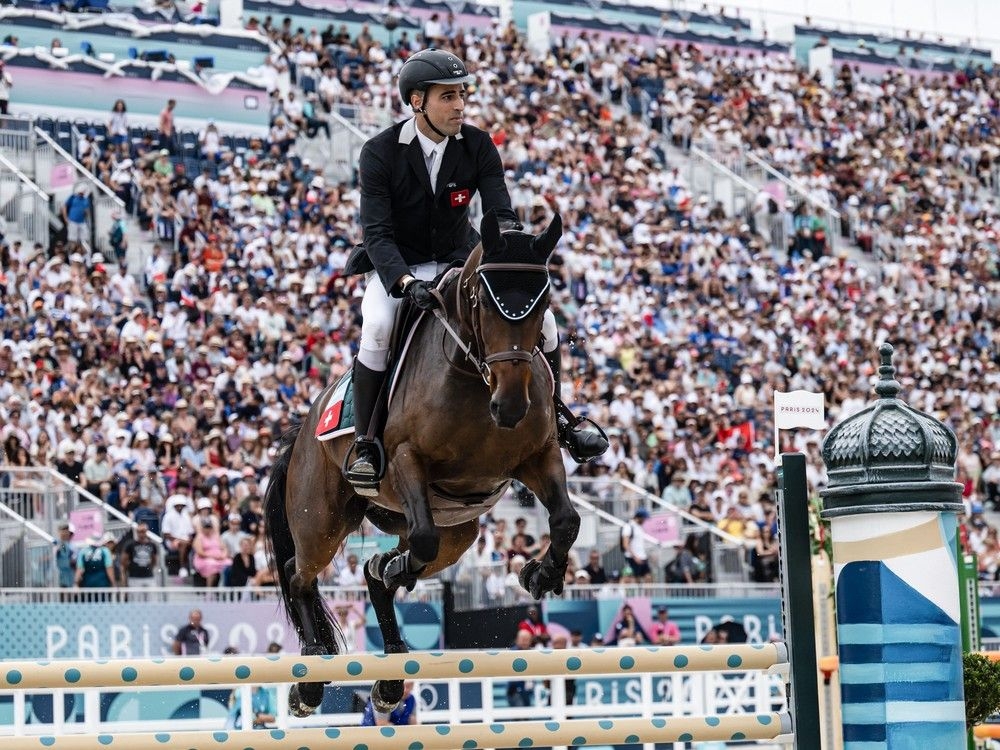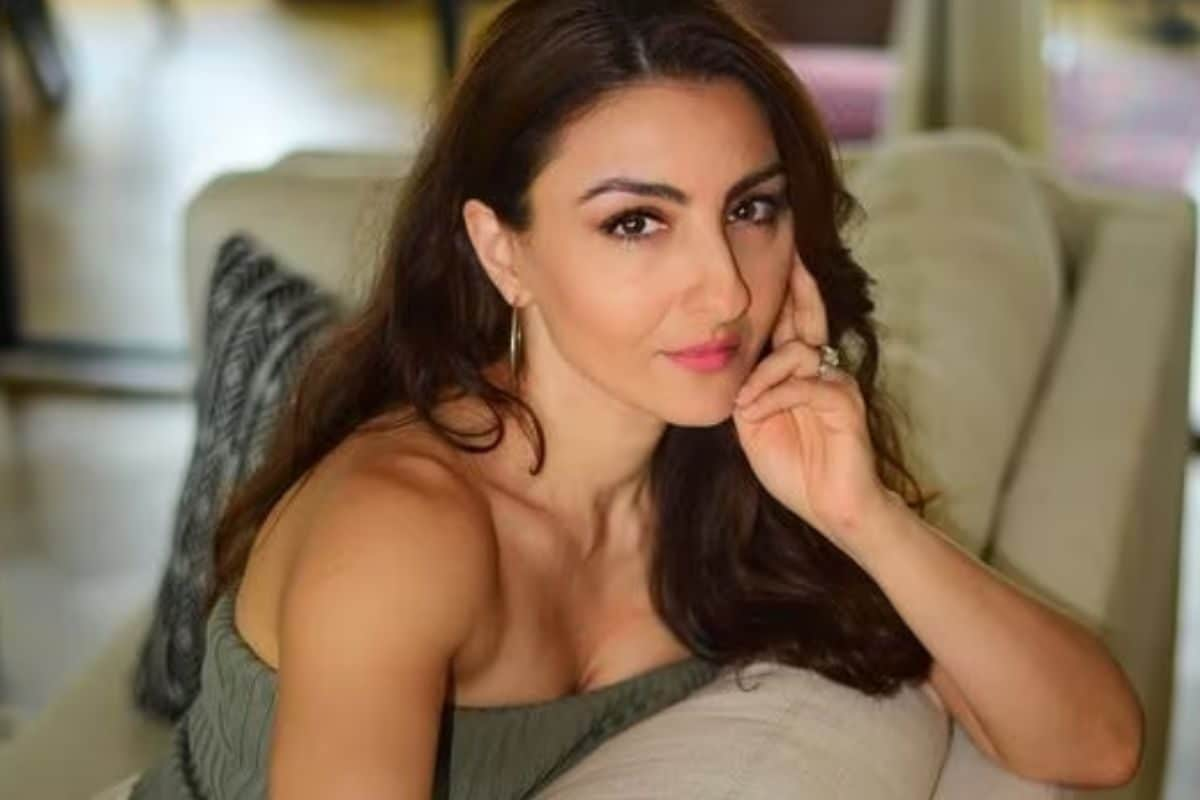VERSAILLES, FRANCE — Alexandre Dallenbach of Switzerland rode into the arena as several hundred fans roared their approval for the French competitor ahead of him. His horse, Grichka Tame, was young and unfamiliar with crowds. Dallenbach had just met the bay mare 20 minutes ago, but could sense she was nervous.
“You’re a good girl, let’s go, you can do this,” he told her. They cantered around the dirt arena on the grounds of the Palace of Versailles, Dallenbach urging the horse over the jumps adorned with the cheerful red phryge of the 2024 Paris Olympics. A little over a minute later, it was over.

They had cleared all 10 jumps and Dallenbach needed to say goodbye to Grichka Tame and get ready to fence. “It was the greatest horse ride of my life,” Dallenbach said after qualifying for the final of the Olympic modern pentathlon. It was also one of the last rides he’ll have like that.
Though horses have been part of the Olympic modern pentathlon since 1912, the sport will move forward without them after these Games. Modern pentathlon — which historically has seen athletes competing in show jumping, fencing, swimming, shooting and running — is a sport inspired by the ancient pentathlon and tests athletes in skills needed by 19th century soldiers. The show jumping discipline is contested on unfamiliar horses randomly assigned to athletes 20 minutes before competition begins.
“Horse riders have a connection to their horse. They see them all the year round. We have to come in and we cannot just tell them ‘OK, let’s go, I’m the boss.
’ You have to be like: ‘OK, hello. You want to work with me?’ And try to make a connection and understand the feeling,” Dallenbach said. Modern pentathlon made headlines three years ago when a German coach was ejected from the 2020 Tokyo Games for punching a horse that refused to take a jump.
In the aftermath of the scandal, the International Olympic Committee gave the sport’s governing body an ultimatum: Reform the sport by replacing horse riding with another discipline — — or get dropped from the Olympic program after Paris. The International Modern Pentathlon Union chose reform. When modern pentathlon is contested at the 2028 Los Angeles Games, there will be no horses.
Instead, athletes will compete head-to-head over a 100-metre obstacle course that will resemble a competition. The decision certainly has been a source of disappointment for some in the modern pentathlon community, says retired modern pentathlete Melanie McCann — whose 11th place finish at the 2012 London Games remains the best-ever Olympic result by a Canadian in the event. Show jumping, she says, always has been a “make-or-break event” in modern pentathlon.
“You had to focus on being a good all-around horseman because you couldn’t really fake it throughout the course of the modern pentathlon,” she said from Paris, where she will be watching the last running of the modern pentathlon as she knew it. This is not the first time modern pentathlon has undergone significant change. The sport was once contested across several days but, by 1996, all disciplines took place within one.
The event was shortened further in 2012 when running and shooting were combined into a single laser run discipline. In Paris, the event is the tightest yet, with semifinals and final each condensed into 90 minutes and held at a single venue. Joshua Riker-Fox, who represented Canada in the modern pentathlon at the 2008 Beijing Games, says the Tokyo horse-punching scandal simply sped up conversations that had been underway for some time.
Riker-Fox got into modern pentathlon because he was part of Canadian Pony Club and loved horses. But the equestrian aspect of modern pentathlon is such a costly and logistical barrier that it is excluded from youth competition, with young athletes only contesting four disciplines. “Equestrian sport is different.
It requires a different type of commitment,” Riker-Fox said. “Access to horses is really not equally available throughout the world. And then, beyond that, jump horses are even less available.
So the accessibility component has been a part of the narrative for many years.” Since retiring from elite sport in 2015, Riker-Fox has been coaching the next generation of modern pentathletes and says he has seen interest in the sport rise since the 2022 announcement that obstacle sport would replace show jumping. “We saw quite immediately that there was an uptick, more people reaching out, people from the obstacle community, wanting to learn about pentathlon,” he said.
“Folks not even in the obstacle community, but who maybe were in track or swimming and so on, and they’re looking at it going: ‘OK, now that the equestrian portion isn’t there, it’s not a roadblock to me being a part of the sport.” Perhaps one of the biggest winners of the change is the obstacle sport community, which is still in its relative infancy compared to the storied modern pentathlon. The sport’s governing body, World Obstacle, was founded just a decade ago as a way to unify the many related obstacle sport bodies that had sprung up including Ninja Competitions, obstacle course races like Spartan Race and adventure racing.
“With obstacle being one of the five events within modern pentathlon at (the 2028 Los Angeles Olympics), it shines the biggest light on what a short-track obstacle race might look like in the future,” said Tom Petryshen, a former Olympic wrestler who did a mud run for fun back in 2008 and is now president of Obstacle Sports Canada. “While it’s going to be part of the modern pentathlon, there’s opportunity then to extend it into a pure 100-meter event that’s held maybe in Brisbane in 2032.” The obstacle course that will make its Olympic debut in the modern pentathlon four years from now will be roughly 100 metres long and feature eight obstacles selected from a catalogue of available obstacles which includes apparatuses that would look at home in a playground such as monkey bars, a balance beam and tilting ladders.
Thirteen-year-old Josiah Longman, who is a fearsome competitor on the Canadian Ninja League circuit, says going to the Olympics “is something I’ve always wanted to do” and is hopeful obstacle course racing will be included in the Olympic program as a sport on it’s own. If not, he hasn’t ruled out picking up swimming, fencing and laser running to become a modern pentathlete. While he may not yet know what his path to the Games looks like, he does know that modern pentathletes like Dallenbach who need to pick up obstacle course racing will need to work on their “upper body strength, lower body strength — you’re going to need it all.
” “It takes time to develop, but once you do, it’s just something anyone can learn. If I’m being honest,” he said. Dallenbach, for his part, hasn’t started training for obstacle sport just yet — “we’re already doing five sports in the day, give me a break please” — but said he plans to start in the coming months as he transitions into a new era for the sport he loves.
Standing in the heart of the Château de Versailles grounds surrounded by an audience that loves show jumping and with an Olympic final in his future, he admits he is feeling the imminent loss of the equestrian event. “I’m going to miss it,” he said. “I’m going to miss it because it’s awesome.
I think it’s teaching kids and people how to respect and love horses. But I’m ready to be a ninja warrior. “It’s a nice place (for it) to come to an end here in Paris.
I don’t know if there is a more beautiful place in the world.”.



















